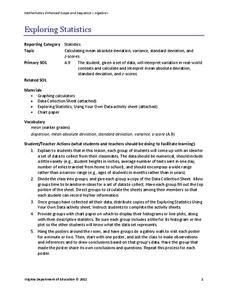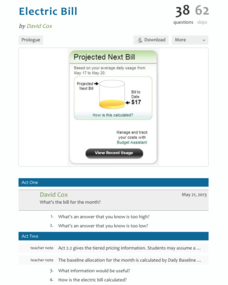Virginia Department of Education
Exploring Statistics
Collect and analyze data to find out something interesting about classmates. Groups devise a statistical question and collect data from their group members. Individuals then create a display of their data and calculate descriptive...
Virginia Department of Education
Linear Modeling
An inquiry-based algebra lesson explores real-world applications of linear functions. Scholars investigate four different situations that can be modeled by linear functions, identifying the rate of change, as well as the strength and...
Chicago Botanic Garden
Leaf Litter Ecology Lab
Some organisms spend their entire lives in leaf litter. The third in a series of six is a great lesson exploring the community of leaf litter. Groups gather and then spread leaf litter over white paper and remove leaves/twigs while...
Virginia Department of Education
Calculating Measures of Dispersion
Double the fun — calculate two measures of deviation. The lesson plan provides information to lead the class through the process of calculating the mean absolute deviation and the standard deviation of a data set. After learning how to...
Chicago Botanic Garden
Historical Climate Cycles
Scientists use ice core samples to obtain temperatures of the earth from 400,000 years ago! The third of five lessons instructs pupils to interpret historical climate data to see changes over time. In part I, participants interpret...
Virginia Department of Education
z-Scores
Just how far away from the mean is the data point? Pupils calculate the standard deviation for a set of data and find out how many standard deviations a point is away from the mean. The teacher leads a discussion on how to calculate...
Teach Engineering
Close Encounters of the Polymer Kind
A PowerPoint presents features of polymers and two of its categories (thermoplastics and thermosets). Instructors conduct demonstrations to illustrate the Weissenberg Effect and the Barus & Kaye Effects of polymers in the first of...
EngageNY
The Structure of Ratio Tables—Additive and Multiplicative
Build tables by understanding their structure. Scholars take a closer look at the structure of ratio tables in the 10th segment in a 29-part series. Individuals realize that the tables can be built using an additive or multiplicative...
National Institute of Open Schooling
General Characteristics of the p-Block Elements
The 20th installment in a series of 36 focuses on the characteristics of the p-block elements. Learners discuss, read about, and answer questions pertaining to the occurrence of these elements in nature, their electron configurations,...
Virginia Department of Education
Congruent Triangles
Is this enough to show the two triangles are congruent? Small groups work through different combinations of constructing triangles from congruent parts to determine which combinations create only congruent triangles. Participants use the...
Space Awareness
Oceans as a Heat Reservoir
Oceans absorb half of the carbon dioxide and 80 percent of the greenhouse gases released into the atmosphere. Scholars learn how and why the oceans store heat more effectively than land and how they help mitigate global warming. Pupils...
EngageNY
Describing Variability Using the Interquartile Range (IQR)
The 13th lesson in a unit of 22 introduces the concept of the interquartile range (IQR). Class members learn to determine the interquartile range, interpret within the context of the data, and finish by finding the IQR using an exclusive...
Columbus City Schools
Diversity of Living Things
Here's a topic classes can really dig—the fossil record. Use the well-organized and thoughtful road map to take eighth graders back in time to unearth the answer. Learn how our climate has changed, and how organisms have changed along...
Channel Islands Film
Dark Water: Lesson Plan 2 - Grade 3
A discussion of bioluminescence launches an investigation of animal adaptations. After re-watching the opening minutes of Dark Water, class members listen to a reading of What Do You Do with a Tail Like This, and then create a new animal...
Polar Trec
Nature's Density Column
Nature provides density columns in the polar regions that provides food for many animals. Young scientists build their own density columns with water in order to answer analysis questions. Through a slideshow presentation, scholars...
Beyond Benign
Breaking the Tension
The tension builds as learners experiment in your classroom. The 17th installment in a 24-part series has scholars investigate the concept of surface tension. After discovering characteristics of surface tension, they add a compound...
Prestwick House
The Absolutely True Diary of a Part-Time Indian
Sherman Alexie's coming-of-age social commentary is the focus of a review worksheet. Learners use clues from The Absolutely True Diary of a Part-Time Indian to complete a crossword puzzle about the novel.
Broadway GPS
ALADDIN: Broadway's New Musical Comedy
Aladdin, Disney's Broadway musical comedy, is a magic carpet ride. Prepare your class for a field trip to the show with a study guide that is a treasure trove of activities, cultural connections, and background information.
Teach Engineering
Spool Racer Design and Competition
Wind it up and let it go. Individuals build a basic spool racer in the second portion of a six-part unit on energy. After receiving three criteria, pupils modify their designs to meet the new challenge. Pairs compete against each other...
101 Questions
Electric Bill
A brilliant resource is at your disposal. Future consumers investigate and discuss an electric bill. Given only partial information, they estimate the monthly bill. They then consider how tiered pricing will affect the bill.
Howard Hughes Medical Institute
Zebrafish and Skin Color
You may not know if that zebrafish in your fish tank is a model citizen—but it is definitely a model organism! What can we learn about ourselves from a tiny zebrafish? Discover more about the polygenic trait of skin color through a...
Nuffield Foundation
Monitoring the Body's Reaction to Stress
When stressed, do you prefer the fight or flight response? Scholars observe, measure, and identify the body's response to stress using a well-researched methodology. They learn about the autonomic nervous system, hormones, and more.
Howard Hughes Medical Institute
Measuring Biodiversity in Gorongosa
Take your biology class' understanding of biodiversity to a whole new level! Ecology scholars use data to calculate three different diversity indices based on the organisms in the Gorongosa National Park. The four-part activity uses an...
American Psychological Association
Counting Fidgets: Teaching the Complexity of Naturalistic Observation
Why do psychologists conduct experiments in controlled laboratory settings? High schoolers gain an understanding of the importance of controls with an activity that involves naturalistic observations with no imposed controls.
Other popular searches
- Direct Variation
- Inverse Variation
- Genetic Variation
- Genetic Diversity
- Direct Variation in Algebra
- Direct and Inverse Variation
- Constant of Variation
- Direct Variation in Graphs
- Human Genetic Variation
- Direct Variation in Math
- Direct Variation and Graphs
- Climatic Variations

























